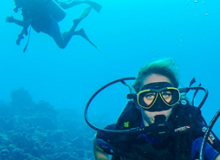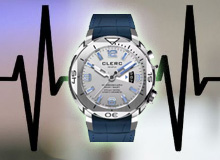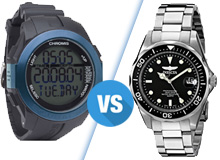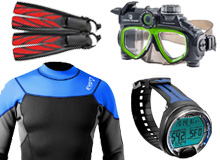 Scuba Diving is a water sport where you need to swim underwater for a long time(usually hours), using underwater breathing apparatus (i.e. a tank filled with compressed air etc) on the back of the “scuba diver” or simply a “diver”.
Scuba Diving is a water sport where you need to swim underwater for a long time(usually hours), using underwater breathing apparatus (i.e. a tank filled with compressed air etc) on the back of the “scuba diver” or simply a “diver”.
In many countries it is illegal to sell diving equipment (not all) to a customer that does not have a required license.
If you are planning to start diving in the near future or you have been doing this for a few years already and want to be more prepared for diving, then this article is for you.
Considering all the equipment that is available on the market for scuba divers, you can make your diving safe, interesting and easy process.
All you need to do is have the required equipment and a guide (if you cannot afford personal trainer/guide then you need to use the internet as a source of education/preparation).
There is always something to learn, no matter how long you have been diving.
What are some basic and at the same time major equipment, that you need to use when diving?
You will definitely need a scuba mask, breathing regulator, fins, snorkel, buoyancy devices, costume, etc.
The choice of equipment is based on the type of diving. There are 4 main types:
- Recreational Diving – this is the most common diving style as it is designed especially for having fun and enjoying your diving. In this case divers do not go very deep and do not need a lot of equipment.
- Technical Diving – similar type is for a diver who is interested in exploring the marine life in details. The divers can do extreme deep diving, advanced wreck diving and advanced cave diving. Keep in mind that the equipment you used for recreational diving is not enough for this, as you need to assure extra safety.
- Commercial Diving – this is something that you do for living. Commercial divers are professionals with years of experience. They construct different things, create underwater maps, make surveys, etc. The equipment used by these professionals is far ahead of those used by recreational divers (and of course, there are several times more expensive).
- Military Diving – this is quite close to commercial, but it also includes special tasks like mine clearing, military research, etc. Military divers have been responsible for the most advanced equipment used during diving.
As a beginner in scuba diving you cannot learn everything in the classroom, it requires a lot of practice. However, there are certain things that you need to learn before diving.
The first skill that is required is to know how to control buoyancy. This helps you to control your body under the water and ensure that your diving will pass without any incident.
Another major skill you need to develop before diving is to know how to work with a regulator. It is your main source of air, and in case of emergency you need to know what to do!
If you take your children along with you for scuba diving make sure that their age is appropriate.
The best age is 12+, however, there are many children that start diving earlier. In that case make sure that the instructor is always next to your child. In order to be in the required physical shape (especially if you are going for a longer dive) you have to exercise all the time.
In some cases if you want to dive longer, or if you want to become a certified scuba diver you will most probably be asked to pass the first simple test – that is to swim for 200 yards and also float for 10 minutes.
The numbers can change based on your location.
If you are just starting to do scuba diving, you need to be extremely careful during discussions with your instructor.
In order to keep your dive safe and pleasant, you need to get familiar with basic skills, like how to dive, where to dive, for how long to dive, how to share air with your buddy in case of emergency, etc.
Even if you have all required equipment, you watched many videos on the web do not dive on your own for the first time; you jeopardize your life and life of any diver that can be next to you under the water. Get a small training with an experienced diver.
Consult with a doctor to make sure that your health condition allows you diving. Your first dive should be short and not very deep. Increase the time spent under the water every time you dive.
When you go for a dive you need to know how to set up your scuba gear, how to get water out of your mask.
If you dive with an instructor you can also probably rent the equipment required for diving which will be suggested by your instructor.
However, if you are a sole diver (or a group diver, but without an instructor) make sure that your equipment is fully set (it should match with the type of diving, the place where you dive and time that you plan to stay under the water).
The general equipment required for diving includes, but is not limited to the following items
- Mask
- Fins
- BCD (buoyancy control device)
- Snorkel
- Scuba Gear
- Regulator
- SPG (submersible pressure gauge)
- Dive Computer/Dive Watch
- Diving Suit
- Knife
- Lights
- Technical Equipment
- Dive Flag
- Signaling Devices
In case you are interested in becoming a certified scuba diver, you can use PADI (Professional Association of Diving Instructors) dive centers’ services, where you can take some courses (part of which can also be taken online), pass all required examinations (practical and theoretic) and enjoy diving.
You will have to complete 5 confined water dives, 4 open water dives and 5 academic sessions. This is mainly a general requirement for all divers, but might vary in some countries.
When you are a certified scuba diver, you have the privilege of diving in different parts of the world, and purchasing all the required equipment (as it was mentioned before in some countries you might face limitation on purchasing certain items required for diving if you do not possess a certificate).
No matter how experienced you are, you always need to keep on practicing, reading and watching about scuba diving, getting new and updated equipment, take proper care of your existing equipment, keep your body in shape – exercise as much as possible and at the same time go for frequent check-ups to make sure that your health condition corresponds to the requirements.




Be First to Comment